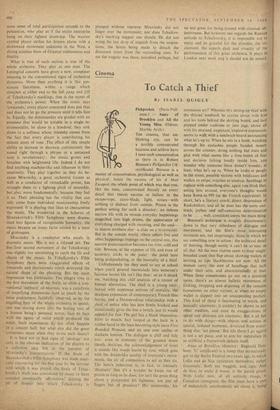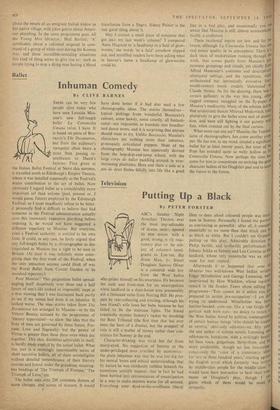Cinema
To Catch a Thief
By ISABEL QUIGLY Pickpocket. (Paris-Pull- man.) — Anna of Brooklyn and All the Young Men. (Odeon, Marble Arch.) THE cinema, that un- blinking eye, can be a terribly concentrated business and seldom have I seen such concentration as there is in Robert Bresson's Pickpocket ('A' certificate). Bresson is a master of concentration, psychological as well as physical; hence the success of his A Man Escaped, the whole point of which was that' you, like the man, concentrated fiercely on every detail that meant success or failure in the escape-rope, razor-blade, light, noises—with nothing to distract from outside. Prison is the perfect setting for such a director: an intense narrow life with its minute everyday happenings magnified into high drama, the appearance of everything charged with meaning, and the soul— as almost nowhere else—a slide on a microscope. But in the outside world, where others live and other happenings impinge on the central one, this narrow preoccupation becomes too trim, cold and tidy. Bresson, at the expense of life and even of accuracy, sticks to the point: the point here being pickpocketing, or the mentality of a thief.
Unfortunately (as they used to say at school When you'd poured marmalade into someone's lacrosse boots) life isn't like that: or so it struck me. watching this chill analysis of a corner of human aberration. The thief is a young intel- lectual with superman notions of morality, the deadpan expression of contemporary French film heroes, and a Dostoievskfan relationship with a chief of police who has him firmly hooked and occasionally gives the line a twitch, just (it would appear) for fun. The girl has a blank impenetra- bility to match, hair looped at the back in a rubber band in the least becoming style since Five Branded Woman, and no one ever smiles or slackens tension. The dialogue is chill and tidy too-: even in moments of the greatest stress (death, decision, the acknowledgement of love) it sounds like words learnt by rote, which goes with the dream-like quality of everyone's move- ments, the air of compulsion to act as they do. The hero's behaviour is, in fact, so intensely `dramatic' that it's a wonder he keeps out of prison as long as he does; for isn't the great thing about a pickpocket his lightness, not just of fingers but of presence? His anonymity, his innocuous air? Whereas this strung-up thief with the thieves' textbook he carries about with him and his tools behind the skirting board, and loot popped under cushions or into jugs, above all with his strained, expectant, explosive expression, seems to walk with a sandwich-board announcing what he's up to. When he sits in a bank, watching through his eyelashes. people handed money across the counter, doing nothing but stare and plot with what seems like a time-bomb of fear and decision ticking loudly inside him, you wonder why someone there doesn't wonder, at least, what he's up to. When he looks at people in the street, possible victims with briefcases and wallets to swipe, watches to unstrap, handbags to replace with something else, again you think that, seeing him around, everyone's thoughts would have flown to 999 (or the French equivalent). lo short, he's a literary crook, direct descendant of Raskolnikov, and all he does has the same one- track, joyless and self-conscious determination to be . . . well, consistent seems the main thing.
Bresson's technique is roughly documentary, down to that very stiltedness of dialogue and movement, and the film's most interesting moments are, not surprisingly, those in which we see something new in action: the technical detail of thieving, though surely it can't be as' easy as all that. All the men victims seem to wear single- breasted coats that flap about showing wallets as inviting as ripe blackberries are now. All the women carry the sort of handbags that tuck under their arm, and absentmindedly at that. When three conspirators go out on a pinching spree, there's an almost balletic movement of frisking, swapping and disposing of the remains (sometimes on other victims, as when an empty wallet is slipped into an unsuspecting pocket). This kind of thing is fascinating to watch, and basically cinematic; it couldn't be shown in any other medium, and even its exaggerations of speed and slickness are cinematic. But it all has to do with things—with objects and actions at special, isolated moments, divorced from every- thing else, 'set pieces.' But life (here l go again) is not a set piece, and to aim for naturalism in so artificial a framework defeats itself.
' Anna of Brooklyn (director: Reginald Den- ham; `I.J' certificate) is a romp that mysteriously got to the Berlin Festival two years ago, in which Lollo and de Sica caricature themselves, rather tiresomely. Both arc waggish, and ogle. And de Sica, to make it worse, is the parish priest. With Lollo now, of all unlikely things, 3 Canadian immigrant, the film must have a sort of melancholy anachronistic air about it, being
about the return of an emigrant Italian widow to her native village, with jokes galore about Ameri- can plumbing. In the same programme goes All tire Young Men (director: Hall Bartlett; `A' certificate), about a coloured sergeant in com- mand of a group of white men during the Korean war, and those incredible-sounding situations this kind of thing seems to give rise to: such as people trying to stop a dying man having a blood transfusion from a Negro. Sidney Poitier is the one good thing about it.
May I correct a small piece of nonsense that got into my last week's column? I compared Anna Magnani to `a headlamp in a field of glow- worms,' the words 'in a field' somehow slipped out, and mystified readers have been asking what in heaven's name a headlamp of glowworms could be.



































 Previous page
Previous page